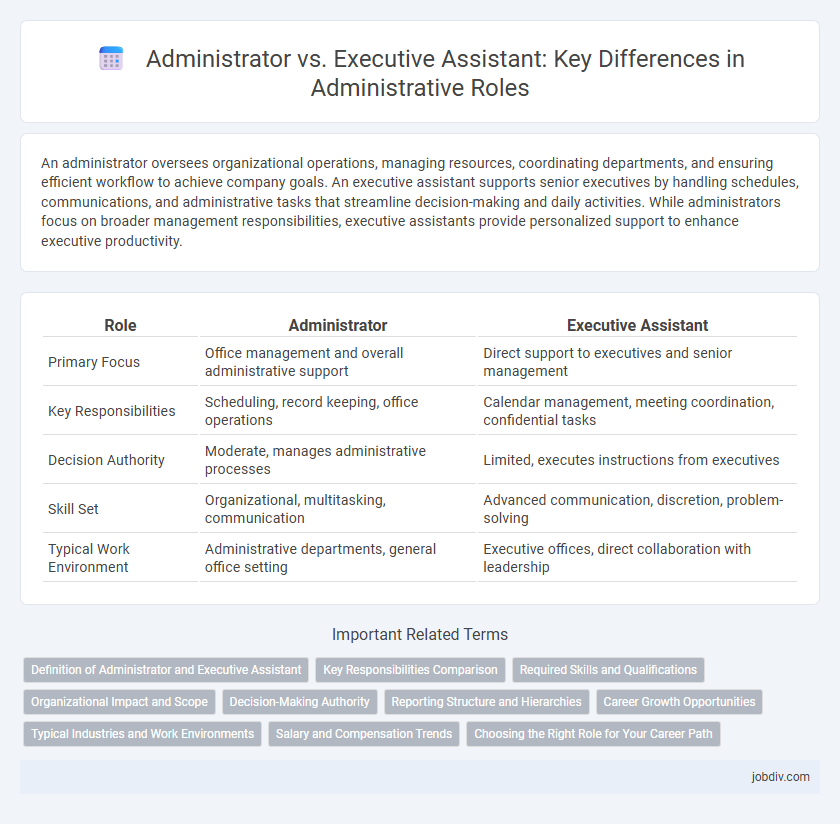An administrator oversees organizational operations, managing resources, coordinating departments, and ensuring efficient workflow to achieve company goals. An executive assistant supports senior executives by handling schedules, communications, and administrative tasks that streamline decision-making and daily activities. While administrators focus on broader management responsibilities, executive assistants provide personalized support to enhance executive productivity.
Table of Comparison
| Role | Administrator | Executive Assistant |
|---|---|---|
| Primary Focus | Office management and overall administrative support | Direct support to executives and senior management |
| Key Responsibilities | Scheduling, record keeping, office operations | Calendar management, meeting coordination, confidential tasks |
| Decision Authority | Moderate, manages administrative processes | Limited, executes instructions from executives |
| Skill Set | Organizational, multitasking, communication | Advanced communication, discretion, problem-solving |
| Typical Work Environment | Administrative departments, general office setting | Executive offices, direct collaboration with leadership |
Definition of Administrator and Executive Assistant
An Administrator manages organizational operations, overseeing processes, resources, and staff to ensure efficiency and compliance with company policies. An Executive Assistant provides high-level support to executives, handling scheduling, communication, and administrative tasks to enhance the executive's productivity. Both roles are crucial in administration, with the Administrator focusing on operational management and the Executive Assistant on executive support.
Key Responsibilities Comparison
Administrators typically oversee office operations, manage schedules, handle correspondence, and ensure compliance with organizational policies. Executive Assistants focus on supporting senior executives by managing calendars, coordinating meetings, preparing reports, and facilitating communication between executives and other departments. Both roles require strong organizational skills, but Administrators tend to have broader operational responsibilities while Executive Assistants provide high-level personalized support to leadership.
Required Skills and Qualifications
Administrators typically require strong organizational skills, proficiency in office management software, and an understanding of business operations to oversee day-to-day functions efficiently. Executive Assistants need advanced communication abilities, discretion, and expertise in calendar management and event coordination to support high-level executives effectively. Both roles demand problem-solving capabilities and adaptability, but Executive Assistants often require more specialized knowledge in handling confidential information and strategic priorities.
Organizational Impact and Scope
Administrators typically oversee broader organizational operations, ensuring compliance, resource allocation, and strategic planning, which directly influences overall efficiency and policy implementation. Executive Assistants focus on managing the schedules, communications, and administrative support for senior executives, enabling effective decision-making and time management at the highest leadership levels. The scope of an Administrator spans multiple departments, whereas Executive Assistants have a narrower focus centered on individual executives, impacting organizational effectiveness through streamlined executive functioning.
Decision-Making Authority
Administrators typically hold higher decision-making authority, overseeing operations, setting policies, and managing teams within an organization. Executive Assistants primarily provide support to executives, managing schedules and communications with limited decision-making power. Their authority is often confined to executing tasks based on executives' directives rather than independent strategic decisions.
Reporting Structure and Hierarchies
Administrators typically hold a higher position in the organizational hierarchy, overseeing multiple departments or teams and reporting directly to senior management or executives. Executive Assistants, by contrast, report to a specific executive or manager, providing personalized support and managing their schedule, communications, and administrative tasks. The reporting structure reflects these roles, with Administrators involved in broader operational oversight and Executive Assistants focused on individual executive assistance within the hierarchy.
Career Growth Opportunities
Administrator roles often provide broader leadership responsibilities and strategic decision-making opportunities, facilitating advancement into senior management or specialized administrative leadership. Executive Assistants typically gain in-depth exposure to high-level executives' workflows, which can lead to career growth in executive management support or transition into project management and operational roles. Both career paths offer valuable skill development, but Administrators may experience a wider scope of upward mobility within organizational hierarchies.
Typical Industries and Work Environments
Administrators commonly work in healthcare, education, and government sectors where managing operations and compliance is crucial. Executive Assistants are typically employed in corporate settings, including finance, law, and technology industries, supporting high-level executives with scheduling and communication. Both roles thrive in office environments but vary in scope, with Administrators often handling broader organizational duties and Executive Assistants focusing on strategic support.
Salary and Compensation Trends
Administrator roles typically command an average salary ranging from $50,000 to $75,000 annually, influenced by industry and experience levels. Executive Assistants often earn higher compensation, with salaries spanning $60,000 to $90,000, reflecting their specialized support to senior management and advanced organizational skills. Recent compensation trends indicate increased pay equity and performance-based bonuses for both positions in corporate and nonprofit sectors.
Choosing the Right Role for Your Career Path
Selecting between an Administrator and an Executive Assistant depends on your career goals and skill set, as Administrators often manage office operations and oversee staff, while Executive Assistants provide high-level support to executives, handling schedules and communications. Understanding job responsibilities, required qualifications, and growth opportunities helps clarify which role aligns best with your ambitions in administration. Aspiring professionals should assess their preference for leadership and organizational tasks versus direct executive support to make an informed career decision.
Administrator vs Executive Assistant Infographic

 jobdiv.com
jobdiv.com